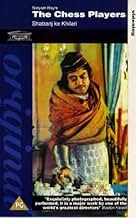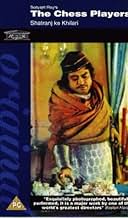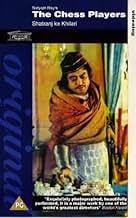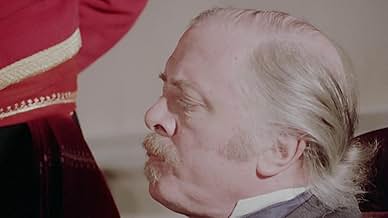IMDb RATING
7.5/10
4.3K
YOUR RATING
In 1856, two obsessed noblemen ignore everything while playing chess and fail to notice British rule extending into their Indian province.In 1856, two obsessed noblemen ignore everything while playing chess and fail to notice British rule extending into their Indian province.In 1856, two obsessed noblemen ignore everything while playing chess and fail to notice British rule extending into their Indian province.
- Awards
- 4 wins & 3 nominations total
Victor Banerjee
- Prime Minister
- (as Victor Bannerji)
Farooq Shaikh
- Aqueel
- (as Farooque Shaikh)
Bhudo Advani
- Abbajani
- (as Budho Advani)
7.54.3K
1
2
3
4
5
6
7
8
9
10
Featured reviews
A classic from a grandmaster
Previous reviews have puzzlingly stated that this is one of the first films to break away from the commercial traditions of Bollywood. In fact, it belongs to a different tradition altogether - art cinema reflecting social themes - which has been going on since at least the early 1950s in India (where it was initially strongly influenced by Italian neo-realism) in the work of Ray, Mrinal Sen, and Ritwik Ghatak. All three were, perhaps significantly, Bengalis, and partook of the rich intellectual traditions of that region, most widely associated with the great poet and national figure Rabindranath Tagore.
The Chess Players is a delight from beginning to end. Taking its cue from the origins of chess as a war-strategy training game, Ray builds two narrative strands in parallel: in the mid-1850s, a pair of idle aristocrats become obsessed by chess and play it all day long, oblivious to the collapse of their domestic relationships that it causes; and in the larger world outside, the scheming and strategy of the chess-board is played out in the real-life scheming of the East India Company as it attempts to manoeuvre the Nawab of Oudh from his throne and bring the state within British jurisdiction. The two plotlines are beautifully brought together at the end when, after hearing that Company troops have moved in and the Nawab has abdicated, the chess-playing friends change their board layout to the Western manner, which involves the king and queen changing their starting positions: "Move over, king. Make way for [queen] Victoria!"
There are fine performances all round: from Amjad Khan as the Nawab, whose infinitely delicate sensibilities lead to infinite puzzlement at the connivings of the less fastidious, to Richard Attenborough as the Company representative in Oudh whose job it is to unseat him, who manages to convey a genuine belief that the state needs to be better run, with an underlying realization that he has no right to do what he is doing. Sanjeev Kumar and Saeed Jaffrey, as the chess players Mirza and Mir, both have extremely expressive faces that can switch from blustering bonhomie to pained hurt, or from deadpan seriousness to quizzical amusement, in a heartbeat. Jaffrey's talent for comedy will come as no surprise to viewers of his English-language films, and he provides the film's finest comic moment when he walks into his bedroom to find his wife trying to hide her lover (his nephew) under the bed - a moment straight out of a Feydeau farce.
Two moments of great artistic beauty stand out for me. First, when the Nawab, overwhelmed by the political situation while in conference with his ministers, seeks solace in a haunting, graceful song he had composed in a happier time (actually composed by Ray - perhaps the director showing us his self-identification with the character). Second, in a scene where Mir is left on his own at the chessboard while Mirza goes off to "see what the trouble is" with his wife, the camera follows Mir as he gets up and goes out into the hallway to see where his friend has got to. The camera then stays still as he retraces his steps, and in the vertical slice of light caused by a gap between two curtains that separate the hallway and the chess room, we see framed the precise point on the chessboard where Mir's hand slowly and surreptitiously comes into view as he sneakily moves one of the pieces. A virtuoso piece of camerawork and compositional framing that, like the film as a whole, never fails to enchant.
The Chess Players is a delight from beginning to end. Taking its cue from the origins of chess as a war-strategy training game, Ray builds two narrative strands in parallel: in the mid-1850s, a pair of idle aristocrats become obsessed by chess and play it all day long, oblivious to the collapse of their domestic relationships that it causes; and in the larger world outside, the scheming and strategy of the chess-board is played out in the real-life scheming of the East India Company as it attempts to manoeuvre the Nawab of Oudh from his throne and bring the state within British jurisdiction. The two plotlines are beautifully brought together at the end when, after hearing that Company troops have moved in and the Nawab has abdicated, the chess-playing friends change their board layout to the Western manner, which involves the king and queen changing their starting positions: "Move over, king. Make way for [queen] Victoria!"
There are fine performances all round: from Amjad Khan as the Nawab, whose infinitely delicate sensibilities lead to infinite puzzlement at the connivings of the less fastidious, to Richard Attenborough as the Company representative in Oudh whose job it is to unseat him, who manages to convey a genuine belief that the state needs to be better run, with an underlying realization that he has no right to do what he is doing. Sanjeev Kumar and Saeed Jaffrey, as the chess players Mirza and Mir, both have extremely expressive faces that can switch from blustering bonhomie to pained hurt, or from deadpan seriousness to quizzical amusement, in a heartbeat. Jaffrey's talent for comedy will come as no surprise to viewers of his English-language films, and he provides the film's finest comic moment when he walks into his bedroom to find his wife trying to hide her lover (his nephew) under the bed - a moment straight out of a Feydeau farce.
Two moments of great artistic beauty stand out for me. First, when the Nawab, overwhelmed by the political situation while in conference with his ministers, seeks solace in a haunting, graceful song he had composed in a happier time (actually composed by Ray - perhaps the director showing us his self-identification with the character). Second, in a scene where Mir is left on his own at the chessboard while Mirza goes off to "see what the trouble is" with his wife, the camera follows Mir as he gets up and goes out into the hallway to see where his friend has got to. The camera then stays still as he retraces his steps, and in the vertical slice of light caused by a gap between two curtains that separate the hallway and the chess room, we see framed the precise point on the chessboard where Mir's hand slowly and surreptitiously comes into view as he sneakily moves one of the pieces. A virtuoso piece of camerawork and compositional framing that, like the film as a whole, never fails to enchant.
British Policy in India
The Chess Players is a curious film by the famed Indian director Satyajit Ray. Half in Hindi and half in English which is curious in itself. The story is about the take over of the Kingdom of Oudh, capital Lucknow, by the British. It shows the complete deceit of the British in their takeover of the Indian Sub Continent using underhand methods based in their emasculation of the Indian rulers. The Nawab of Oudh is a cultured Muslim ruler in the tradition of The Moghuls. The qualities admired by the culture of the time were not militaristic and patriarchal but cultural and aesthetic. The Nawab often sang songs to his people and danced for them or read poetry and wrote it of course. This was considered by the British to show signs of effeminacy and not good government. I fact the subjects of the Nawab who were for the most part Hindus, loved their Ruler for precisely these qualities and even though he was of a different faith, lived happily in a cultural paradise. The British represented by Richard Attenborough show a total lack of understanding of this culture and in a cynical move annex the kingdom and send the Nawab into exile.There was interestingly enough, no attempt at resistance but a bland acceptance of the will of God. Strangely sad and haunting film from one of India's greatest directors since Independence. Trivia. Lucknow was the city that Cliff Richard was born in and lived as a child before Independence.
A Ray Classic
Being from a particular region in a country like India comes with its goods and not so goods. People from one part of the nation don't necessarily always know of the legendary works of art that happen in another place. Like people in Orissa being unaware of the deep rooted humanitarian movies that come out of the Tamil movie industry or folks in Kerala not aware of some genuinely wonderful pieces of cinema from West Bengal. One cant do too much about this divide given that the Herculean and almost obnoxious presence of 'Bollywood' continues to act as the fort that isolates several pockets of creative work in their own shells. Sad but true.
Then there are some film makers whose movies transcend language and region. Film makers like the late Academy Award winner Satyajit Ray sa'ab. OK - I will admit. Except for a few brief scenes from 'Pather Panchali' I have not seen any other movie of this great man. Reason? Well, either it was the lack of the need to have to sit through a language I know nothing of and having to squint at the badly framed English subtitles or it was just plain desi callousness that believes the majority is usually right. You know, the classic Indian thinking that has the 'if everyone says it then it has to be great' attitude peppered all over it. I am sure there are millions out there who will still tell you that Satyajit Ray was an amazing movie maker without having seen a single frame he might have shot. Considering I too have indulged in such blatancy every now and then, 'Shatranj Ke Khiladi' seemed like the only chance I would get to savor Mr. Ray's cinematic beauty. After all, it was indeed the only Hindi/Urdu movie he made in his life, isn't it? Hence when I found the chance I took it.
Set in the late 1800s in the then Hindustan 'Shatranj Ke Khiladi' runs with two main stories parallel to one another. One – the larger of the two which shows a determinedly boorish English General Outram (a much younger looking Sir Richard Attenborough) pitted against Awadh's incompetent yet culturally aware Mughal King Wajid Ali Shah (a generously rotund Amjad Khan). The company wants to take over Awadh which remains the final province that is still run by royalty. So it decides to look past a decade old treaty that had promised that Awadh's royalty would never be lost. But, knowing the way the company ruled the sub-continent, the poetically humane King's defiance is brought under test as the concubine infested regal refuses to budge from his throne.
The second interestingly laid out strand is that of old buddies Mirza Sajjad Ali (a wonderfully flawless Sanjeev Kumar) and Mir Roshan Ali (an effervescent Saeed Jaffrey). These two upper middle class noblemen who sit around all day sucking at their well made hookahs and ignoring their frustrated spouses are absolutely obsessed with the game of chess. It is as if nothing – not even the lack of pawns to play with – can stop them from going at it well and good for a few hours each day. While Sajjad Ali's wife (Shabana Azmi is a small but well placed role) decides to find solace in the housekeeper's stories, Roshan Ali's wife (a chubby and visibly mischievous Fareeda Jalaal) chooses to find solace in the arms of a much younger man (a nervous Farooque Shaikh) right under the nose of her unsuspecting husband.
Ray beautifully juxtaposes the story of two chess players with the moves that take over their province and their lives as a foreign power enters their land. While the King is confronted by the orders of the Union Jack under the umbrella of the soulful songs he has composed, the chess players continue to find ways to get a good spot to sit down and well - play a good round of chess. A game, as it turns out, that ends up putting their friendship at stake just like the throne of their clueless King.
The one thing that comes off as obviously as the attention to pretentious 'paan holders' by these Lucknawi laat saahebs is Ray's understanding of the human condition in those times. The beautiful focus to detail of the surroundings only amplify the saga that unfolds eventually while the red vested British army marches into the Awadh province. Cinematography is crisp and captures the fading lights of the royal reign quite effectively. What struck me as more amazing was Ray's wonderful acknowledgement to the way such potentially affluent cultures used to work during that era. The fact that people in them would rather spend more time on keeping their indulgences alive than worry about their future under the Raj was an eye opener to say the least.
Performances wise everyone does his/her bit effectively. Seasoned actors Sanjeev and Saeed chip in a beautiful contribution. A young Amjad Khan (still fresh from the finely baked success as 'Gabbar Singh' in Sholay) delivers an earnest performance as the King who has his heart in the right place but his head in the wrong spot. As mentioned earlier, a tight lipped Sir Attenborough with a fluent Tom Alter play the scheming Englishmen who are preparing for Awadh's fall with orders from Her majesty the Queen.
All said and done 'Shatranj Ke Khiladi' definitely stands out as a Ray classic that is truly a testament to his life as a master story teller. I am glad that even if this is the only movie I will ever watch of Mr. Ray then at least it is based on a story by the legendary Shri Munshi Premchand. Could there be a better example of two Hindus coming together to design such a sensitive and relevant epic about the Muslim reign and culture? Unlikely, according to me.
Then there are some film makers whose movies transcend language and region. Film makers like the late Academy Award winner Satyajit Ray sa'ab. OK - I will admit. Except for a few brief scenes from 'Pather Panchali' I have not seen any other movie of this great man. Reason? Well, either it was the lack of the need to have to sit through a language I know nothing of and having to squint at the badly framed English subtitles or it was just plain desi callousness that believes the majority is usually right. You know, the classic Indian thinking that has the 'if everyone says it then it has to be great' attitude peppered all over it. I am sure there are millions out there who will still tell you that Satyajit Ray was an amazing movie maker without having seen a single frame he might have shot. Considering I too have indulged in such blatancy every now and then, 'Shatranj Ke Khiladi' seemed like the only chance I would get to savor Mr. Ray's cinematic beauty. After all, it was indeed the only Hindi/Urdu movie he made in his life, isn't it? Hence when I found the chance I took it.
Set in the late 1800s in the then Hindustan 'Shatranj Ke Khiladi' runs with two main stories parallel to one another. One – the larger of the two which shows a determinedly boorish English General Outram (a much younger looking Sir Richard Attenborough) pitted against Awadh's incompetent yet culturally aware Mughal King Wajid Ali Shah (a generously rotund Amjad Khan). The company wants to take over Awadh which remains the final province that is still run by royalty. So it decides to look past a decade old treaty that had promised that Awadh's royalty would never be lost. But, knowing the way the company ruled the sub-continent, the poetically humane King's defiance is brought under test as the concubine infested regal refuses to budge from his throne.
The second interestingly laid out strand is that of old buddies Mirza Sajjad Ali (a wonderfully flawless Sanjeev Kumar) and Mir Roshan Ali (an effervescent Saeed Jaffrey). These two upper middle class noblemen who sit around all day sucking at their well made hookahs and ignoring their frustrated spouses are absolutely obsessed with the game of chess. It is as if nothing – not even the lack of pawns to play with – can stop them from going at it well and good for a few hours each day. While Sajjad Ali's wife (Shabana Azmi is a small but well placed role) decides to find solace in the housekeeper's stories, Roshan Ali's wife (a chubby and visibly mischievous Fareeda Jalaal) chooses to find solace in the arms of a much younger man (a nervous Farooque Shaikh) right under the nose of her unsuspecting husband.
Ray beautifully juxtaposes the story of two chess players with the moves that take over their province and their lives as a foreign power enters their land. While the King is confronted by the orders of the Union Jack under the umbrella of the soulful songs he has composed, the chess players continue to find ways to get a good spot to sit down and well - play a good round of chess. A game, as it turns out, that ends up putting their friendship at stake just like the throne of their clueless King.
The one thing that comes off as obviously as the attention to pretentious 'paan holders' by these Lucknawi laat saahebs is Ray's understanding of the human condition in those times. The beautiful focus to detail of the surroundings only amplify the saga that unfolds eventually while the red vested British army marches into the Awadh province. Cinematography is crisp and captures the fading lights of the royal reign quite effectively. What struck me as more amazing was Ray's wonderful acknowledgement to the way such potentially affluent cultures used to work during that era. The fact that people in them would rather spend more time on keeping their indulgences alive than worry about their future under the Raj was an eye opener to say the least.
Performances wise everyone does his/her bit effectively. Seasoned actors Sanjeev and Saeed chip in a beautiful contribution. A young Amjad Khan (still fresh from the finely baked success as 'Gabbar Singh' in Sholay) delivers an earnest performance as the King who has his heart in the right place but his head in the wrong spot. As mentioned earlier, a tight lipped Sir Attenborough with a fluent Tom Alter play the scheming Englishmen who are preparing for Awadh's fall with orders from Her majesty the Queen.
All said and done 'Shatranj Ke Khiladi' definitely stands out as a Ray classic that is truly a testament to his life as a master story teller. I am glad that even if this is the only movie I will ever watch of Mr. Ray then at least it is based on a story by the legendary Shri Munshi Premchand. Could there be a better example of two Hindus coming together to design such a sensitive and relevant epic about the Muslim reign and culture? Unlikely, according to me.
Ray's unique gift
This movie is a precious gem. I have not seen anything like it and only a rare amount of movies dare to be as different. One cannot expect any less from Satyajit Ray, one of India's greatest filmmakers. Shatranj ke Khiladi is a satirical comedy that stars the best actors delivering the finest performances. Amjad Khan and Saeed Jaffrey definitely did their best for this movie. Sanjeev Kumar and Shabana Azmi are excellent as always. Richard Attenborough and Victor Banerjee do very well with their small roles. I was also surprised to see Farida Jalal in a negative comic role as an unfaithful wife. Ray also applies his artistic talents in set designs as you'll see some beautiful paintings. Background music is limited but used effectively. The movie was shot brilliantly where it is quite evident that the director has given attention to very little detail. There is one scene where Sanjeev Kumar goes to his room to see his wife. Saeed Jaffrey is waiting for him. We soon see a scene where Jaffrey goes to check on Sanjeev then when he returns...we see a hand changing the position on the chess board. This is just one of the finest example of excellent direction, among the many you'll witness in this classic masterpiece. The events of the 19th century are portrayed very poetically. While some may say that the pace is slow, it did not bore me one bit and there was always something happening. This, indeed, is a fine piece of film-making. I suggest you go and watch it.
Checkmate? You better check your wife, mate!
Shatranj Ke Khilari is Sayajit Ray's first Hindi movie. It is, though a bit too slow at points, special, different, comic, and as a result unusually entertaining. This satirical drama is humorous, interesting and impressive, and Ray's direction is excellent. It is evidently well invested, with glossy sets and costumes. The writing is superb, with the brilliantly-written dialogues surpassing the storyline itself, and the culture and the atmosphere of those times is captured exceedingly well. All these aspects, along with the music composed by Ray and the fantastic narration of Amitabh Bachchan, create an engagingly artistic and poetic piece. Ray casts some of the most talented leading actors from the Hindi film industry, all of whom suit their roles and do a wonderful job. Amjad Khan is great as Nawab Wajid Ali Shah. Sanjeev Kumar and Saeed Jaffrey are exceptional as the chess-obsessed noblemen, who ironically indulge in ceaseless chess playing while showing minimal interest in the state of their marriages, wives and even their nation. Shabana Azmi and Farida Jalal play their neglected wives, and they excel in their very tiny roles (each has only a few minutes on-screen). Azmi is convincing as the frustrated Khurshid and Jalal is awesome as the unfaithful wife who has an affair with her husband's nephew Aqueel. Richard Attenbrough and Victor Banerjee provide great support. Shatranj Ke Khilari is a nice little film. It is not among the very best of Ray, but it is certainly a worthy picture and of the most strikingly unique films of those times.
Did you know
- TriviaSanjeev Kumar stated that the film flopped due to the masses not understanding the film. The pace was quite slow and scenes lengthy. The scene between Tom Alter and Richard Attenbourogh were too stretched. The English dialogue just added up to its failure.
- Quotes
Mir Roshan Ali: Jinse apni biwi-yan nahin sambhli woh angreaz fauz se kya ladenge. Translation : Those whom couldn't even care for their wives, would not be able to fight the British army.
- ConnectionsFeatured in Celluloid Man (2012)
- How long is The Chess Players?Powered by Alexa
Details
- Release date
- Country of origin
- Languages
- Also known as
- Die Schachspieler
- Filming locations
- Indrapuri Studios, Calcutta, West Bengal, India(studio: Indrapuri Studios, Calcutta)
- Production company
- See more company credits at IMDbPro
- Runtime
- 2h 9m(129 min)
- Sound mix
Contribute to this page
Suggest an edit or add missing content




































